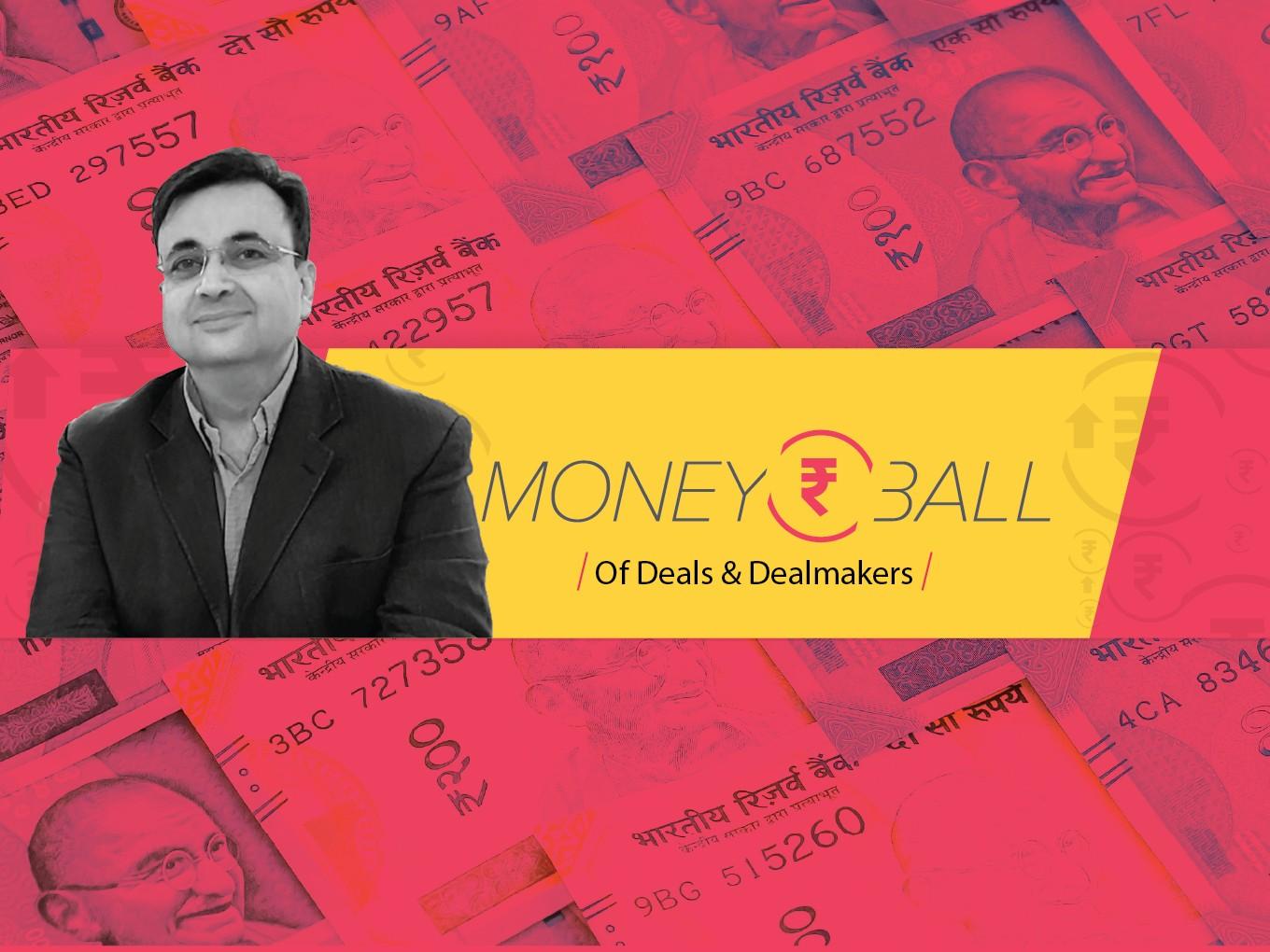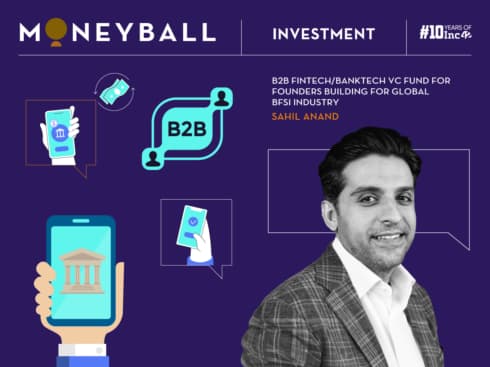Mobility-focussed VC AdvantEdge’s Kunal Khattar wants to see founders who can't sleep at night trying to solve a problem
"India is a capital-deficit country, but we have surplus capacity in almost everything." - Khattar
AdvantEdge's portfolio includes Shuttl, Rapido, Sheru and Chalo
Moneyball
An open tête-à-tête with some of the most influential investors – angels, VCs, corporate funds actively investing in the Indian startup ecosystem on their views about various industries, the ecosystem, and their future plans.
The high risk-high reward world of venture capital is an ever-shifting world where the future of business is predicted today. Inc42’s Moneyball is series which focuses on the who’s who of the venture capital world, deconstructing the trends, how it works, the impact it has, why it works and what it feels like to be part of the world of venture funding. This week, we speak to Kunal Khattar, managing partner of AdvantEdge Founders. Explore other Moneyball stories here.
“I keep telling people that entrepreneurship is a marathon race that you run in multiple hundred-meter sprints. Any founder who has been at it for a few years will know exactly what I am talking about.”
Kunal Khattar, the managing partner of AdvantEdge Founders, an early-stage mobility-focussed venture capital fund does not mince words when it comes to the hard road to success. Khattar professes that as a failed founder himself, the kind of founders he likes to back are the ones who have identified a problem so large that it doesn’t allow you to sleep at night.
Comprising entirely of former founders and with deep roots in the auto industry, AdvantEdge focusses on investing in early-stage startups across shared mobility, electric vehicles, digital auto and logistics domain and runs a highly-successful mentor building programme at its ‘Founders Adda’ Incubator in the NCR region.
In our first edition of Moneyball for 2020, we catch up with Khattar on early-stage investments, the potential of shared mobility and the fund’s plans for 2020.
(Edited excerpts)
Inc42: 2019 changed the conversation around unit economics, growth and profitability. What is your take on the year that went by?
Kunal Khattar: I think those are positives. As a fund, we are slightly conservative, we only invest in businesses which don’t have very high burn rate as we don’t have a very large fund. We look at scale and not just growth at any cost. For us to make sure that the burn per ride or the burn per customer is going down is more important than month-on-month growth. As a fund, we strongly believe that valuations are based on revenue and EBITDA and not just on scale. I don’t think you can have long term success by growing only on investor capital. Therefore focus for us has always been on building good products.
By discounting and giving cashbacks, you only create numbers but never loyalty.
And then there is the added distraction of focussing only on growth and not the product. So we make sure that in 6-8 months of investing in a startup it has a path to profitability and profitability at an operating level.
Inc42: What is your style of venture capital investment?
Kunal Khattar: Being a very early stage investor, AdvantEdge starts with mentor building for founders who don’t even know what product to focus on. We sit with them and help them identify a potential business and opportunity. After this is the stage where we do seed investing, where the founders have a product or at least a PoC (proof of concept). So here we help them find the right market fit, contacts. So that typically takes another year or two. After this, we do a Series A round and help the company find bigger investors who have larger corpuses and more experience in building such companies. So mentor building and seed investment are the two things we really work on.
Inc42: A lot of your companies are leveraging the sharing economy. What is the potential you see in shared mobility and coliving spaces?
Kunal Khattar: India is a capital deficit country, but we have surplus capacity in almost everything. Assets are not being fully utilised, whether it’s busses, motorcycles or residential spaces. So that’s we are steering away from asset-heavy businesses. We believe that instead of improving capacity if you are improving utilisation it is a better way to profitability. So across our portfolio we have stuck to a simple thesis of no asset-heavy businesses. If we see that in a vertical there is existing capacity but low utilisation, we will be interested in it. Take Rapido, for instance. While it is marketed as a bike-taxi service, it is actually a bike-sharing platform. You have about 280 Mn motorcycles on the roads, but if you look at the asset utilisation it is a mere 10-12%. On the other hand, about 90% of bike owners are either students or working part-time. So the business model is that you have enough supply, you have under-utilisation and you have owners who could use the extra money. So that’s why you don’t have to spend money on building assets.
Inc42: How do you see the shared mobility space shaping up 5 years from now?
Kunal Khattar: Looking at all the form factors, such as micro distances, small, medium and long commutes, over the last few years, investments have gone largely to medium, which is intracity. In the last year or so, we have been focussing on commutes under 2 km. The other thing that we see a lot of disruption in is electric vehicle form factors to bring down operating costs. And that will start with two-wheelers. So I think Rapido could be a strong proponent of that. It won’t happen very rapidly because infrastructure is not there yet but what’s important is to stay ahead of the curve. So as a mobility fund it will be our core focus area in the future.
Inc42: India has one of the lowest per capita GDP. How does that feature in your calculations as an investor in mobility solutions?
Kunal Khattar: So we look at it from three angles. The first is when we look at shared mobility, Uber and Ola with the four-wheeler form factor will only be relevant to 0.2% of the population. Our fund is focussed on the next 100 Mn customers who are the people that have the budget to spend just about a dollar for a ride. If you look at Sheru, Rapido, Chalo or Shuttl, all of these priced at little above or below that limit.
The other thing we realised is that if you look at India’s per capita income, due to the population of $1.3 Bn, income per person seems low but if you look at the top 100 to 200 million daily commuters, then the per capita income is much higher and they have disposable income also.
Thirdly, the average Indian spends about 21% of their income on commuting. That is pretty much inelastic. They are not able to increase it as that would dent their disposable income. They can definitely reduce it but that would mean sacrificing comfort. So we have to be able to give them a ride in that much without subsidising the ride.
Inc42: Shared mobility unit economics are still quite unforgiving. What do you think is the solution?
Kunal Khattar: If you are trying to expand beyond the market that can afford you, the only way you can do that is through subsidies. We have been very cognizant of this and know that the only way to grow is through affordable products. In our portfolio, Shuttl is the only business which has a very high network effect. It is not a point-to-point solution like a Rapido or a Sheru. For Shuttl, you have to be able to fill up the bus and travel 20 to 30 km. Because of the high network, the initial cash burn will be high so as to acquire customers who live within walking distance of the drop-off points. But that also creates huge exit barriers for your customers and entry barriers for your competitors. So once you build that dense Shuttl network in a city, every bus and route will start showing profits. So Shuttl will be a highly profitable business at scale.
You are going to have to run very very fast and keep running, take a break, pivot, change the business, break it, change it… there is no straight line to success. And I have never met a successful startup that has not had a near death experience.
Inc42: When you take on a startup at the early stage what are the most important things you work on with the founder? Give us a personal checklist
Kunal Khattar: I think we are definitely hands-on investors because we are all ex-founders and we specifically focus on automotive, mobility and transportation. We have done deep research in these fields and studied successful international models. So if we find a good founder, we recommend them one of these fields. If we find a startup which is already working in a field that fits our investment thesis, we work with them on the right product strategy, the right goto market — things that we have faced in our own startups early on. In the domain, we have strong ties with the entire auto ecosystem so we are able to leverage the ecosystem of our limited partners who are in the automotive domain to provide an unfair competitive advantage to our founders. And of course, we also help them in their day-to-day operations wherever we can.
Inc42: What are the kind of founders that you are attracted to?
Kunal Khattar: We love failed founders for a number of reasons.
From the outside, people who have never become founders, when they read about founders who have succeeded get very excited about being a successful founder themselves. Many of them become entrepreneurs for the wrong reasons, thinking it is a way to have fame and fortune.
I don’t think that works. At the end of the day, the objective of becoming an entrepreneur is that you have identified a “hair on fire” problem. If you have identified a problem so large that you can’t sleep at night, that is the kind of founder we want to back.
If you think about it, about 90% of the startups fail. Most of these founders go back to corporate. But it’s the ones that hang around and refuse to throw in the towel who will work extra hard the next time.
So, we love failed founders, I am a failed founder myself. But we also look for reasons not to invest. If we don’t find any such reason, we go ahead and sign the check.
































 Ad-lite browsing experience
Ad-lite browsing experience